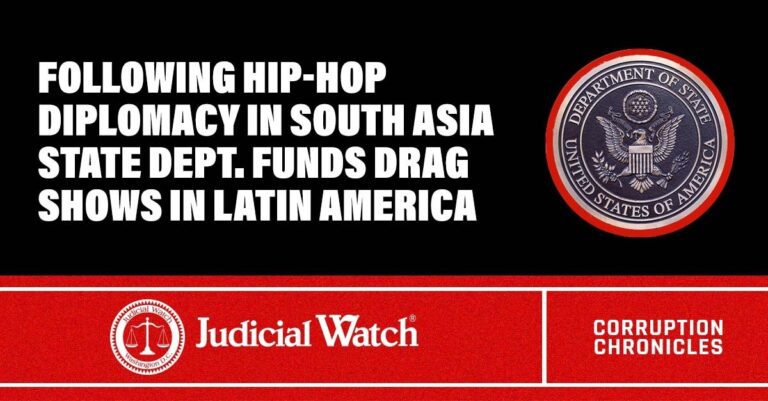October 25, 2022
|
Judicial Review

In another dubious venture by the State Department to achieve foreign policy goals through the arts, the agency is giving a Latin American country nearly $21,000 to produce a drag show. The goal, according to the government’s grant announcement, is to promote diversity and inclusion by funding three workshops, 12 drag plays and a two-minute documentary. The project is part of the State Department’s foreign diplomacy programs, which aim to advance national interests and enhance national security by informing and influencing foreign publics, according to the grant document. The initiative also seeks to expand and strengthen the relationship between the people and government of the US and citizens of the rest of the world.
It remains unclear how a dozen drag shows can help achieve this, in Latin America of all places. The shows usually feature grown men dancing in women’s clothes and heels, exaggerated wigs and heavy make-up often accented with glitter. American taxpayer dollars to fund drag shows in the name of diversity and inclusion will go to a nonprofit in Ecuador, a country of about 18 million people that elected a conservative president last year. The group is called Centro Ecuatoriano Norteamericano de Cuenca and is located in the city of Cuenca in the southern Andes mountains of Ecuador. The non-profit organization was founded in the late 1950s to strengthen ties and friendship with the US through intellectual and cultural exchanges. This includes conferences, concerts, sporting events and English classes for Ecuadorians. The group’s Spanish-language website also says its vision includes facilitating US government-sponsored “social responsibility” programs in Cuenca.
Perhaps the US-funded performances fulfill the social responsibility need of the Ecuadorian charity, although the Biden administration is not offering specifics on how the performances will further the State Department’s diplomatic mission to promote US foreign policy. A spokesperson for the agency told a national newspaper that the grant is part of “a wide range of strategic programs in Ecuador that include concepts from diversity, inclusion and representation to equality and access.” The spokesperson added that the grant to the Ecuadorian nonprofit uses the arts to raise awareness of diversity and inclusion. “The goal of the program is to promote tolerance, and the arts provide new opportunities for LGBTQI+ Ecuadorians to express themselves freely and safely,” the State Department spokesperson said in the article.
This is not the first time a controversial artistic endeavor abroad has received funding from the State Department. The agency also spent $70,000 on hip-hop diplomacy, even though the music famously promotes violence, misogyny, drugs and lawlessness. The initiative aimed to promote American culture in India by exploring the commonalities and differences between the South Asian nation and the US through what the State Department calls an “influential musical genre.” It was a particular choice as Hip-hop, a predominantly African-American brand, has a very dark side and is known for graphic lyrics involving urban violence and the abuse of women. Instead, the State Department praises hip-hop musicians for using their “art to highlight socio-political issues, particularly as they relate to youth in underserved minority communities.” The agency contends that hip-hop will serve as a valuable vehicle for showing the vibrancy and innovative creativity of American society because it exemplifies free expression that promotes values such as pluralism, tolerance and inclusion.
Sticking with the topic of waste, just a few months ago the State Department allocated $800,000 to study whether its $2 million youth violence prevention initiative in El Salvador is effective. It’s safe to say the answer is no, given that youth criminal gangs are endemic in the impoverished Central American country, but the agency is handing out extra cash to confirm it. The new investigation will focus on the Police Athletic League (PAL) youth program that Uncle Sam has funded in El Salvador to the tune of $2 million. The money flows through the Bureau of International Narcotics and Law Enforcement Affairs (INL), a branch of the State Department created in the late 1970s to reduce drug trafficking to the US from Latin America. INL claims to keep Americans safe by fighting crime, illegal drugs and instability abroad. It is heavily funded by Congress, and the State Department requested $456.8 million for its drug-related programs in fiscal year 2022. The funds help strengthen the rule of law, protect human rights, law enforcement capacity, counter corruption and other critical efforts around the globe, according to the budget request.


